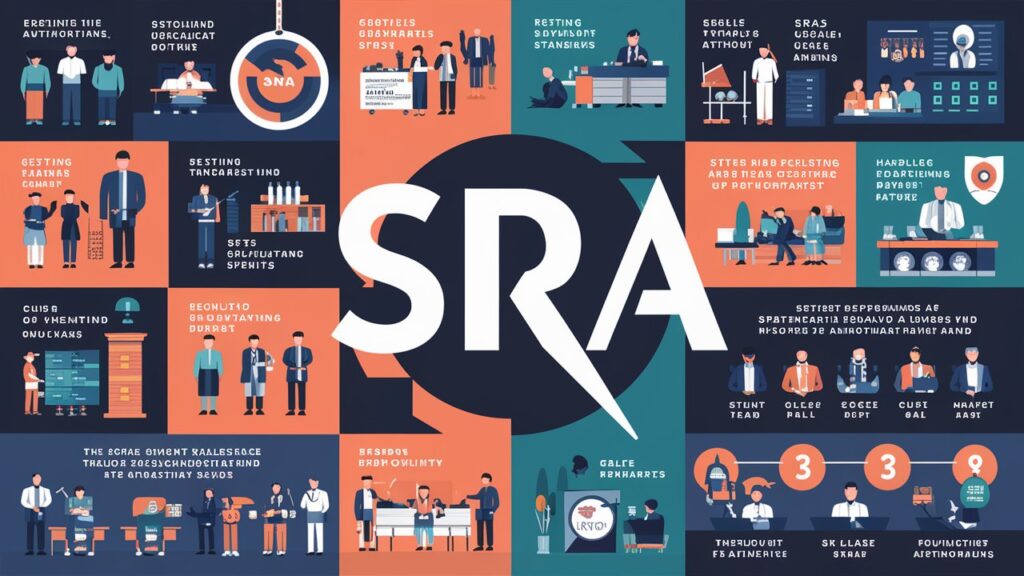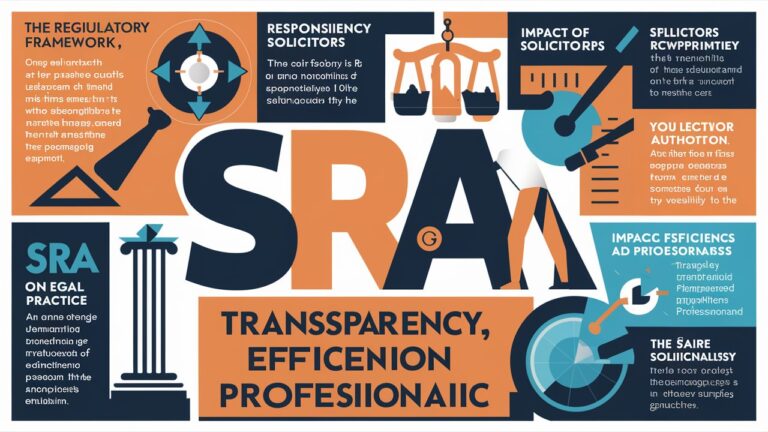Introduction
The Solicitors Regulation Authority (SRA) is a cornerstone of the legal profession in England and Wales, ensuring that solicitors uphold the highest standards of integrity, competence, and ethical conduct. Established under the Legal Services Act 2007, the SRA operates as an independent regulatory body tasked with overseeing solicitors, law firms, and other legal practitioners. Its mission is to protect the public by maintaining trust in legal services while fostering a transparent and accountable profession. This article delves into the SRA’s structure, regulatory framework, and its profound influence on legal practice, addressing common questions about its role and significance.
1. What is the Solicitors Regulation Authority (SRA)?
The Solicitors Regulation Authority is the primary regulatory body governing solicitors and law firms in England and Wales. It operates independently of the Law Society, which represents solicitors’ interests, ensuring that regulation remains impartial and focused on public protection. The SRA sets educational and professional standards, investigates misconduct, and enforces compliance with legal and ethical guidelines. By licensing solicitors and law firms, it ensures that only qualified individuals and entities can offer legal services, safeguarding clients from unqualified practitioners.
The SRA’s authority stems from legislation, including the Solicitors Act 1974 and the Legal Services Act 2007, which grant it powers to create rules, impose sanctions, and even revoke licenses in cases of serious breaches. Its work is vital to maintaining public confidence in the legal system, as it holds solicitors accountable while promoting access to justice.
2. Key Roles and Responsibilities of the SRA
The SRA’s responsibilities are multifaceted, covering every stage of a solicitor’s career—from qualification to practice. Setting Standards is a core function: the SRA outlines the academic and vocational requirements for becoming a solicitor, including the Solicitors Qualifying Examination (SQE). It also mandates continuing professional development (CPD) to ensure practitioners stay updated on legal changes.
Enforcement and Compliance are equally critical. The SRA investigates complaints against solicitors, ranging from negligence to unethical behavior. It employs measures such as fines, suspensions, or striking off solicitors from the roll to address misconduct. For law firms, the SRA conducts audits to ensure adherence to anti-money laundering (AML) regulations, client protection rules, and financial transparency.
Additionally, the SRA promotes innovation in legal services. By revising restrictive practices, such as allowing non-solicitor ownership of law firms through Alternative Business Structures (ABS), it encourages competition and accessibility in the legal market.
3. The SRA’s Regulatory Framework
The SRA’s regulatory framework is codified in the SRA Handbook, a comprehensive document outlining principles, codes of conduct, and administrative rules. Central to this framework are the SRA Principles, which require solicitors to act with honesty, independence, and in the best interests of clients. These principles underpin all professional decisions, from client confidentiality to conflict management.
Another key component is the SRA Code of Conduct, which provides detailed guidance on topics like client care, fee transparency, and diversity within firms. The SRA also enforces Accounts Rules to ensure proper handling of client funds, reducing the risk of misappropriation.
The regulatory framework is dynamic, evolving to address emerging challenges such as cybersecurity threats, climate change disclosures, and the ethical use of artificial intelligence in legal practice.
4. The SRA’s Impact on Legal Practice
The SRA’s influence extends far beyond rule-making. By enforcing rigorous standards, it shapes the culture of legal practice. For example, its emphasis on diversity and inclusion has pushed firms to adopt equitable recruitment practices and create inclusive workplaces. Similarly, its focus on client-centric services has led to clearer communication about costs and outcomes, enhancing client satisfaction.
The introduction of the SQE in 2021 marked a seismic shift in legal education, replacing the traditional Legal Practice Course (LPC) with a standardized assessment. This change aims to diversify the profession by reducing barriers to entry while ensuring consistent competency across all solicitors.
Moreover, the SRA’s support for technology-driven legal services has accelerated the adoption of digital tools, from online dispute resolution platforms to AI-powered contract analysis, improving efficiency and accessibility.
5. Public Protection and Consumer Rights
A central pillar of the SRA’s mandate is protecting the public. It operates a Compensation Fund to reimburse clients who suffer financial losses due to dishonest solicitors. The fund underscores the SRA’s commitment to accountability, ensuring victims are not left uncompensated.
The SRA also empowers consumers through its transparency requirements, obliging firms to publish details about pricing, services, and complaint procedures. This empowers clients to make informed choices when selecting legal representation.
Additionally, the SRA collaborates with other agencies, such as the Legal Ombudsman, to resolve disputes and address systemic issues affecting service quality.

6. Challenges and Criticisms Facing the SRA
Despite its critical role, the SRA faces scrutiny. Critics argue that its regulatory complexity creates burdens for smaller firms, stifling innovation. Others highlight delays in resolving complaints, which can undermine public trust.
Another contentious issue is the balance between regulation and professional autonomy. Some solicitors argue that overly prescriptive rules limit their ability to adapt to client needs. Conversely, consumer groups sometimes push for stricter oversight to prevent misconduct.
The SRA has responded by streamlining processes, such as simplifying reporting requirements and investing in digital tools to expedite case handling.
7. The Future of the SRA: Adaptation and Innovation
Looking ahead, the SRA must navigate a rapidly changing legal landscape. Technology regulation will remain a priority, particularly as AI and blockchain redefine service delivery. The SRA is expected to issue guidelines on ethical tech use, ensuring innovation aligns with professional standards.
Globalization also poses challenges, as cross-border legal services demand harmonized regulations. The SRA’s participation in international regulatory networks will be crucial to addressing jurisdictional conflicts.
Finally, the SRA’s commitment to sustainability may see it introduce environmental, social, and governance (ESG) criteria into its regulatory framework, aligning the legal sector with broader societal goals.
Conclusion
The Solicitors Regulation Authority is indispensable to the integrity of legal services in England and Wales. By balancing robust oversight with support for innovation, it ensures solicitors meet the highest ethical and professional standards while adapting to modern challenges. For the public, the SRA is a guardian of trust; for the profession, it is both a watchdog and a catalyst for progress. As legal practice evolves, the SRA’s role will remain pivotal in shaping a fair, accessible, and dynamic legal system.
Frequently Asked Questions (FAQs)
1. What does the SRA do?
The SRA regulates solicitors and law firms in England and Wales, setting educational and ethical standards, investigating misconduct, and ensuring compliance with legal obligations to protect the public.
2. How can I check if a solicitor is regulated by the SRA?
Use the SRA’s online Solicitor Register, which provides details about a solicitor’s practicing status, qualifications, and any disciplinary history.
3. What should I do if I have a complaint about a solicitor?
First, raise the issue with the solicitor or their firm. If unresolved, contact the SRA for regulatory breaches (e.g., dishonesty) or the Legal Ombudsman for service-related complaints.
4. How does the SRA differ from the Law Society?
The Law Society represents solicitors’ interests, while the SRA regulates them independently to ensure public protection.
5. Can the SRA compensate clients for solicitor misconduct?
Yes, the SRA’s Compensation Fund may reimburse clients who suffer financial loss due to a solicitor’s dishonesty or failure to account for funds.
6. What are the consequences of violating SRA rules?
Sanctions range from fines and warnings to suspension or removal from the roll of solicitors, depending on the severity of the breach.
This comprehensive exploration of the SRA underscores its vital role in upholding justice and professionalism in the legal sector.
